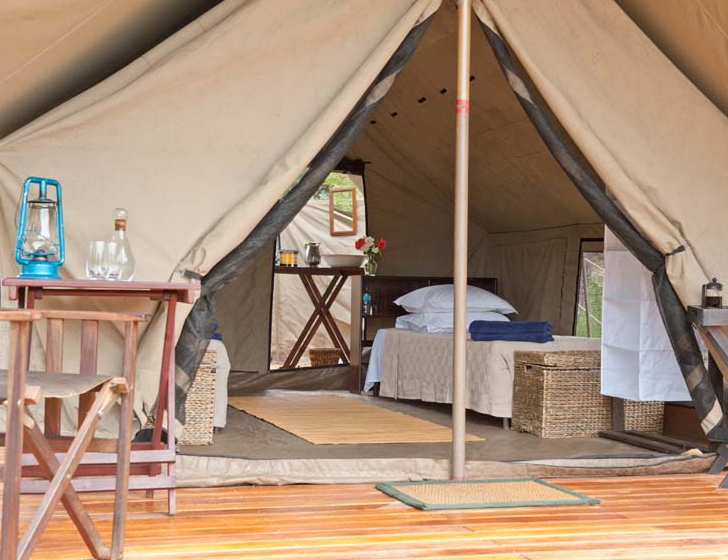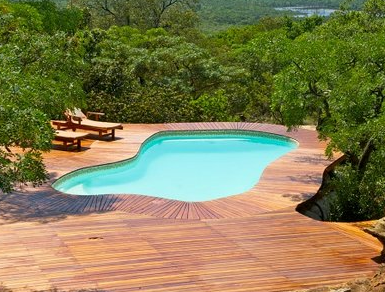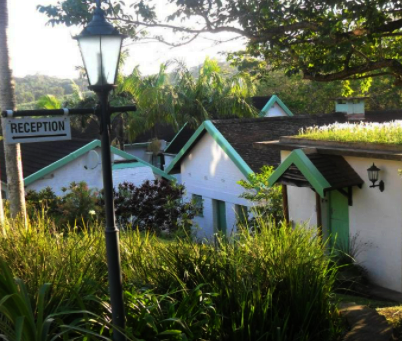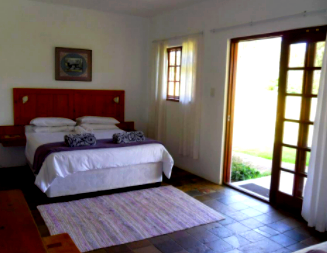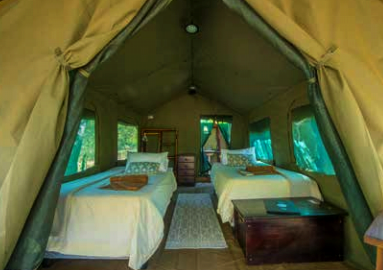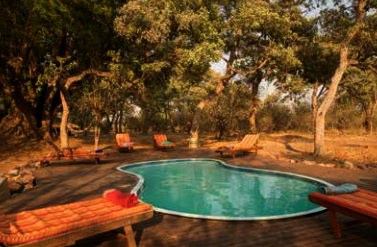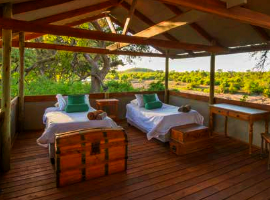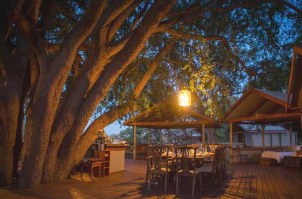- Excellent value for this horse safari
- One of the most varied safaris, between South Africa and Botswana
- Encounters with elephants and often lions, leopards, ...
- Accommodation in elegant and typical camps
- Return transfer to Johannesburg by plane taxi
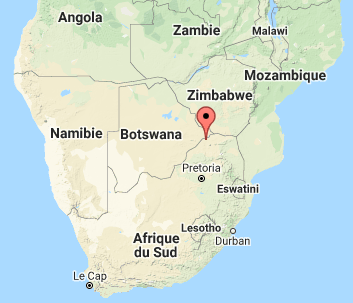
This horsebak riding safari allows you to discover two South African countries: South Africa and Botswana. You will travel through the African bush and its magnificent wild fauna, and you will also be able to learn more about the rich history of these countries. You will be accommodated in tents on the ridges overlooking the grassy valleys. The tents are equipped with beds with sheets and duvets. Each tent has a shower with buckets. The second half of your horse safari takes you north of the Limpopo Valley in the Tuli Block region of Botswana. The trails here allow you to discover the bush and the famous Tuli sandstone formations. The region is famous for its elephants, but you will also discover impalas, girafes, hyenas, lions, leopards and wild dogs. At Limpopo you stay at Two Camp Mashatus, a semi-permanent tent camp.
HORSEBACK SAFARIS
SEE ALL OUR OFFER: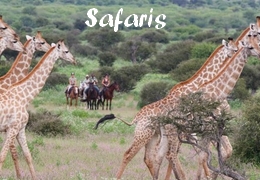

BOTSWANA & SOUTH AFRICA HORSE RIDING SAFARI
INDICATIVE ITINERARY:
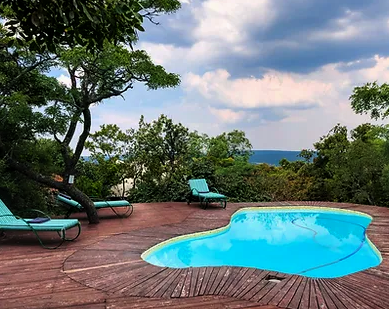 Day 1 - Friday: Arrival. Meet at ORTambo at 9:30 am and transfer to Camp Davidson in time for a late Lunch. That afternoon you will be introduced to your safari horse. We will ensure that you are matched to a horse that suits your ability and experience before heading off on your ride. This first introductory ride is a relaxed affair, giving riders the opportunity to settle into their new surroundings. Crossing the plains, enjoy your first close encounter with wildlife on horseback. A stunning lookout spot for sundower drinks is a welcome moment to take in your first taste of Africa after a long journey. A three course supper is served at Camp Davidson that evening.
Day 1 - Friday: Arrival. Meet at ORTambo at 9:30 am and transfer to Camp Davidson in time for a late Lunch. That afternoon you will be introduced to your safari horse. We will ensure that you are matched to a horse that suits your ability and experience before heading off on your ride. This first introductory ride is a relaxed affair, giving riders the opportunity to settle into their new surroundings. Crossing the plains, enjoy your first close encounter with wildlife on horseback. A stunning lookout spot for sundower drinks is a welcome moment to take in your first taste of Africa after a long journey. A three course supper is served at Camp Davidson that evening.
Day 2 - Saturday: Today’s ride sets off from the high country overlooking a beautiful wilderness area to the east, and heads south, winding along the banks of Sunset Lake with its resident pod of hippos and the odd sly crocodile, followed by a visit to one of the Horizon dams for a swim with the horses before getting back to camp in time for lunch. Guests can then relax by the pool, before a shorter afternoon ride. NB Those guests not fully vaccinated (including booster if overdue) will be taken for a PCR test during the lunch break (additional cost R1450 pp). Overnight at Camp Davidson
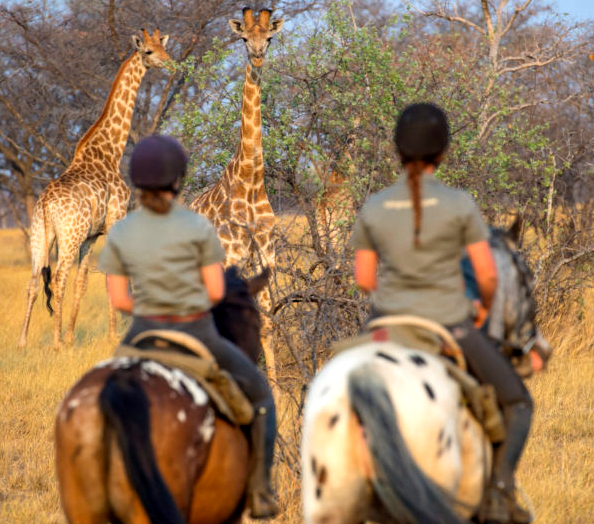 Day 3 - Sunday: This ride heads south to the Game Conservancy which is home to the Bellevue Lodges. The ride traverses a wide wetland, home to reedbuck and grass owls, before entering dense woodland dotted with wild fig trees and large fruited bushwillows. Here it crosses the watershed and descends through open grasslands with sweeping views to the upper reaches of the Conservancy’s main water system. The route passes the favoured habitat of waterbuck and Cape buffalo. The open plains that follow are aptly known as “Little Serengeti”; large herds of blesbuck, eland, wildebeest and kudu are all on view, as are groups of elegant sable, swift red hartebeest and impressive journeys of giraffe and Cape buffalo. After a lunch at the lodge and a rest by the pool, the afternoon ride continues to explore this game rich area, closing with sundowners overlooking the African plains. Overnight at Bellevue lodges.
Day 3 - Sunday: This ride heads south to the Game Conservancy which is home to the Bellevue Lodges. The ride traverses a wide wetland, home to reedbuck and grass owls, before entering dense woodland dotted with wild fig trees and large fruited bushwillows. Here it crosses the watershed and descends through open grasslands with sweeping views to the upper reaches of the Conservancy’s main water system. The route passes the favoured habitat of waterbuck and Cape buffalo. The open plains that follow are aptly known as “Little Serengeti”; large herds of blesbuck, eland, wildebeest and kudu are all on view, as are groups of elegant sable, swift red hartebeest and impressive journeys of giraffe and Cape buffalo. After a lunch at the lodge and a rest by the pool, the afternoon ride continues to explore this game rich area, closing with sundowners overlooking the African plains. Overnight at Bellevue lodges.
Day 4 - Monday: A morning ride in search of buffalo before returning to the lodge for lunch and a chance to relax and enjoy this fabulous setting before riding back to the Horizon lodge where we say our goodbye to our horses before heading up to camp for a last night at Camp Davidson.
Day 5 - Tuesday: Wake up early and depart the camp by 6 am with a picnic for the road, our aim is to leave Botswana and have you through the border by 9am, aiming to arrive at Mashatu by 1 pm, in time for lunch and a chance to change before the afternoon ride to Tree Camp, Dinner and night at the unique Tree Camp.
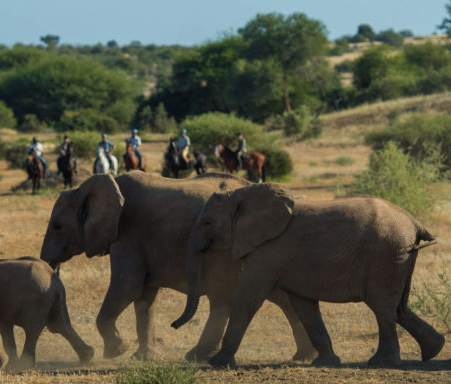 Day 6 - Wednesay: A morning ride from Tree Camp exploring the center of the reserve and the game rich Pitsane river area, before arriving at Two Mashatus for lunch and a chance to relax by the pool. That afternoon there is the option of another ride or a game drive in the Kgotla area with sundowners on the Mmagwa hills. Overnight at Two Mashatus Camp.
Day 6 - Wednesay: A morning ride from Tree Camp exploring the center of the reserve and the game rich Pitsane river area, before arriving at Two Mashatus for lunch and a chance to relax by the pool. That afternoon there is the option of another ride or a game drive in the Kgotla area with sundowners on the Mmagwa hills. Overnight at Two Mashatus Camp.
Day 7 - Thursday: You depart for a morning game drive from Two Mashatu from Two Mashatu. In the afternoon, you have the option of a bush horse or bush walk or, if available, a game drive with Mashatu with a good chance of seeing the big cats (additional cost of 65$ per person), then return to Two Mashatus for your last night in Africa. Overnight at Two Mashatus camp.
Day 8: Departure. A good long morning ride from Two Mashatus ending back at the stables in time for lunch and a shower before flying out of Mashatu at 2:30 pm.
* Please note that due to changes in weather and other unforeseen events, the itinerary and accommodation used may change at the last minute.
MEETING:
Day 1 (Friday) at Johannesburg airport. Car transfer to the first camp.
Please book flights that arrive no later than 9:30 a.m.
DEPARTURE:
Day 8 (Friday) at Johannesburg airport.
Please book flights that depart no earlier than 8 p.m.
FLIGHTS:
Flights from/to Johannesburg are not included in our prices because it is generally more interesting to book your flights yourself, an inclusive flights package is generally more expensive with agency commissions. However, we are at your disposal to help you find the best rates or to offer you a trip including transport on request: free service.
Before booking your flights: send us your schedules to check the consistency with the transfer schedules.
RIDING ABILITY: ![]()
You must be an experienced riders. You must ride regularly (at least once or twice a week) and be comfortable at posting trot, light seat canter and gallop, as well as being able to do small jumps should you have to. You must be able to control a horse independently of the group at all paces.
On the first afternoon ride in South Africa: there will be a short, simple riding test out in the bush. Guests will be asked to take part in a single file group canter. Then they will ride their horse away from the group between three points, varying the pace between a collected and an extended canter. The first exercise is to demonstrate that the rider is able to control their horse at an even pace within a group canter, without overtaking or allowing large gaps to develop within the group. The second is to demonstrate their ability to control their horse independently from the group. Those who fail, will not be allowed to ride in the group. They will be brought down to the lodge once a day for a shorter, slower ride, either on their own or with other riders of similar ability staying in the lodge. No financial compensation can be requested in this case.
RYTHM:
Horse paces are the walk for animal observation, fast between the observation zones. 4-6 hours per day on average (20-30 km per day).
AGE:
The usual minimum age is 16 but exceptions can be made for private groups or very competent riders. Riders under the age of 12 cannot be accepted.
GUIDES:
Guides leading the safari have many years’ experience and most have grown up in the area and know the bush like the back of their hand. Our guides have either professional or assistant guiding licenses with the Botswana Qualifications Authority. They are qualified to use firearms and qualified in first aid. All rides are conducted by two experienced professional guides. The lead guide is armed with a rifle and a bull whip. All management staff and guides do regular first aid training with a specialized doctor for remote areas. The lead guide has a local phone and a radio for use in emergencies.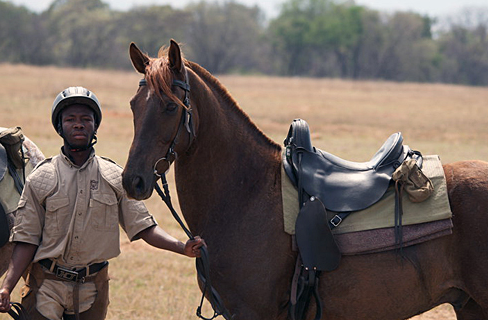 HORSES:
HORSES:
A herd of 96 horses in South Africa and 53 horses in Botswana. The herd is comprised of Boerperds, Throroughbreds, Warmbloods and Arab crosses. They range in size from 14.3hh to 17 hh. Their schooling generally concentrates on English style, although the horses neck rein when in the bush. They respond easily and lightly to the aids. All of the horses have been individually selected for their temperament and "ride-ability" on safari. They are from the various South African breeds, which are well known for being of a hardy nature and able to cope under extreme conditions. Horses have been hand selected for their endurance, courage and responsiveness. The philosophy has entailed managing horses as a free roaming herd within large tracts of natural pasture, rather than in stables or paddocks. Horses are at ease with each other and within their environment, which generates calm and contented natures.
TACK:
Saddles are South African McClellan’s, a cavalry saddle designed for long hours of riding, they offer particular comfort and airflow for the horses back and padded seats and fenders for the rider's comfort.
ACCOMMODATION:
Nights are indicative: they may change depending on the dates & availability.
Friday, Saturday, Sunday: Camp Davidson (South Africa) - Monday: Bellevue lodge (South Africa) - Tuesday, Wednesday: Two Mashatus (Botswana) - Thursday: Tree Camp (Botswana).
Camp Davidson - South Africa :
A re-creation of the original Camp Davidson has been built high in the bushveld above the Matlapeng valley. It offers the opportunity to explore on horseback from a secure base camp nestled in the heart of the wooded mountains and commands a wonderful panoramic view of the central highlands of the Waterberg range, while overlooking the picturesque Sunset Lake at the eastern boundary of the ranch property. Stay in decked canvas tents nestled amongst the sandstone ridges overlooking grassy valleys. Each luxury tent has an en-suite bathroom. The camp is completely run on solar energy and has a small swimming pool.
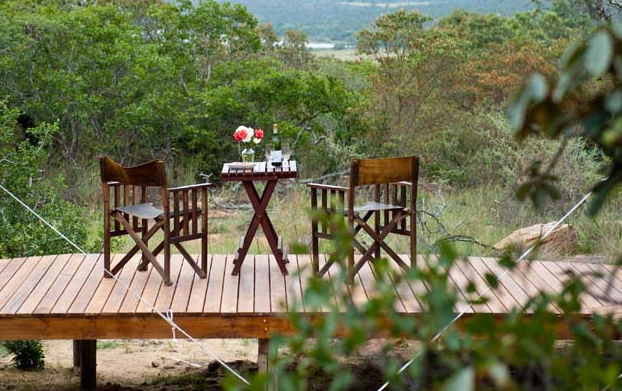
Bellevue Lodge - South Africa :
This luxury lodge is within a morning's ride from Camp Davidson and offers excellent riding and plenty of game. It is located on the south western side of the conservancy and is tastefully decorated lodge with 5 en-suite rooms. The lodge had a large comfortable living space and dining areas inside and outside.
There is a small pool and deck which overlooks a plain and watering hole close by, where wildlife can frequently be seen.
There are no Wi-Fi facilities at the lodge.
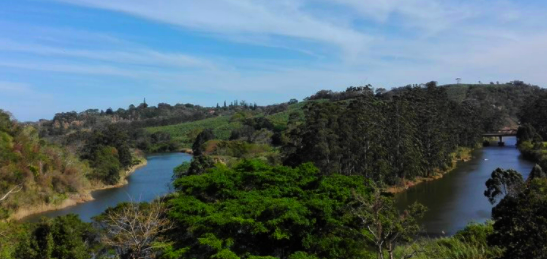
Two Mashatus Camp - Botswana :
Nestled in the shade of two large Mashatu trees, the heart of the camp has two traditionally built Lala Palm rondavels for dining and lounge areas.
Guest accommodation is in large A-frame walk-in tents set on teak platforms each with en-suite enviro drop toilet and hot water shower. Each tent is private and positioned in the shade of a tree in the bush, not far from the main area. Each tent has a small deck area in front where guests can relax privately during the afternoons.
Two Mashatus Camp also has a small swimming pool under a Mashatu tree for guests to enjoy.
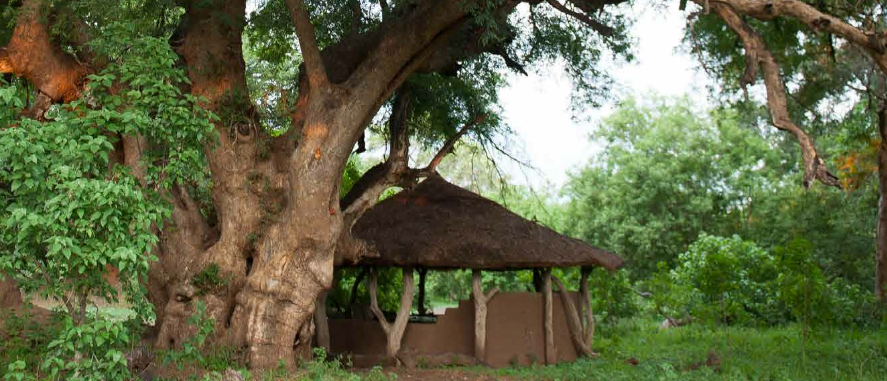
Tree Camp - Botswana :
A very special camp. You sleep in huts perched 4 meters above the ground in a giant Mashatu. Cabanes for 2 airy and fresh people. Shared showers and toilets. The spacious dining room and living room overlook the Majale River. This camp will truly provide you with unforgettable memories.
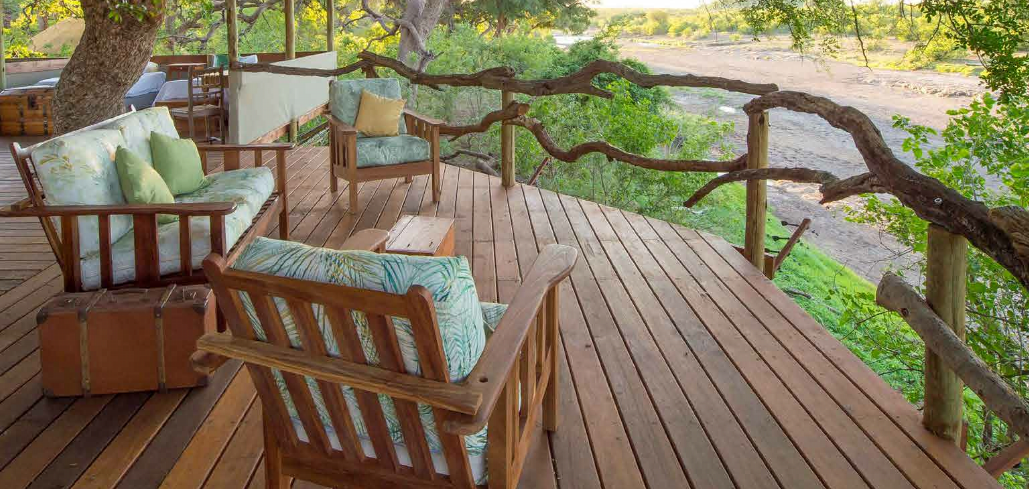
MEALS:
All meals are included from lunch on Day 1 to brunch on your last day. Two highly trained experienced bush chefs will look after your every need. Breakfast is buffet of cereals, toast, muffins, or porridge. Lunch is a buffet usually quiches, salads, fruits, and dessert. Dinner is a 3 course meal served to you at the table, often under the canopy of stars !
All water in the camp is filtered to the highest standards and is guaranteed perfectly safe for drinking. All drinks are included with your tour. We can cater to dietary restrictions if given prior notice.
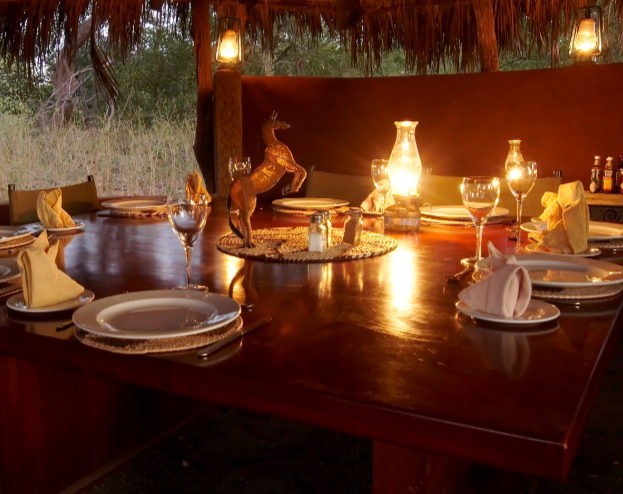
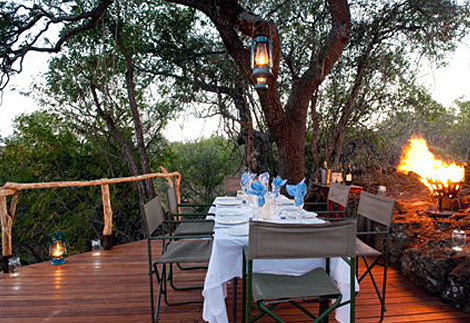
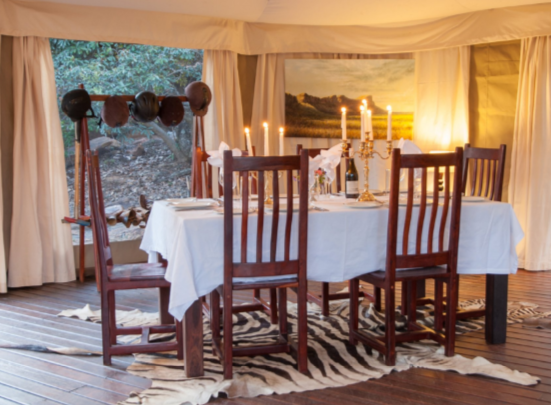
2025 PRICES / PER PERSON *:
02/01 to 30/01 & 05/12 to 04/01/2026: 3700 € in 2-3 person shared tents/bedrooms
01/02 to 06/12: 4500 € in 2-3 person shared tents/bedrooms
Taxes: 60 US$ per person to be paid locally
Booking fees: 15 €
* Prices may be revised down or up depending on the exchange rate.
Options:
Single tent: As an early booking offer there is one tent which can be allocated to a single person without payment of a supplement - the tent will be strictly allocated on a first-come, first-served basis. Once this tent has been allocated, a single supplement of 50% is payable to guarantee a single tent. There is no single supplement if you are willing to share.
Day 7 "Big Cats" car safari option if available: 65 $ / person payable locally.
2026 PRICES / PER PERSON *:
02/01 to 29/01 & 04/12 to 04/01/2027: 3990 € in 2-3 person shared tents/bedrooms
01/02 to 04/12: 4890 € in 2-3 person shared tents/bedrooms
Taxes: 60 US$ per person to be paid locally
Booking fees: 15 €
* Prices may be revised down or up depending on the exchange rate.
Options:
Single tent: As an early booking offer there is one tent which can be allocated to a single person without payment of a supplement - the tent will be strictly allocated on a first-come, first-served basis. Once this tent has been allocated, a single supplement of 50% is payable to guarantee a single tent. There is no single supplement if you are willing to share.
Day 7 "Big Cats" car safari option if available: 65 $ / person payable locally.
PRICES INCLUDE:
Horse and tack rental, local guides, accommodation, meals, drinks, road arrival transfer from Johannesburg airport, flight departure transfer to Johannesburg airport, South Africa to Botswana transfer during the safari, the financial guarantee of your payments by our deposit of travel operator.
PRICES DON'T INCLUDE:
Individual insurance, personal expenses, tips, local taxes ($30 to be paid locally), flights to/from Johannesburg, anything not indicated in "the price includes".
INSURANCE:
A civil liability and travel insurance (assistance/repatriation) is compulsory. A cancellation insurance is strongly recommended.
A payment by credit card can make you benefit from its possible insurance (check your contract).
We offer to Europe Union, Switzerland, Liechtenstein, Norway residents: the Chapka insurances.
Cap Security: full insurance with cancellation. Cap Cancellation: cancellation only.
See prices & information
FLIGHTS:
Flights to/from Johannesburg are not included because it is more interesting to book directly your ticket: a transport package included is generally more expensive with agency commissions. However, we are at your disposal to help you find the best prices or to offer you a flight included package on request.
Availability is indicative and may vary quickly: contact us to check the date you are interested in
CLIMATE:
Month | Jan | Feb | Mar | Apr | May | Jun | Jul | Aug | Sep | Oct | Nov | Dec |
Average High Temperature (°F) | 84 | 84 | 82 | 79 | 75 | 70 | 70 | 75 | 80 | 82 | 83 | 84 |
Average Low Temperature (°F) | 63 | 62 | 60 | 54 | 47 | 41 | 41 | 45 | 51 | 56 | 59 | 62 |
Average High Temperature (°C) | 29 | 29 | 28 | 26 | 24 | 21 | 21 | 24 | 27 | 28 | 28 | 29 |
Average Low Temperature (°C) | 17 | 17 | 16 | 12 | 8 | 5 | 5 | 7 | 11 | 13 | 15 | 17 |
Average Precipitation (days of rain) | 10 | 8 | 8 | 6 | 1 | 0 | 0 | 0 | 1 | 6 | 10 | 11 |
SEASONS:
The climate over most of Southern Africa is temperate. Hot, dry conditions are usually encountered in the Tuli region. Heavy summer thunderstorms of short duration in the late afternoon and evening may be experienced. Rainfall occurs mostly during the summer months (October - March).
Summer (December to February):
The temperatures are high and there is a lot of humidity in the air. The chances of convectional thunderstorms are great. Some of the summer migrant birds begin to arrive. The characteristic call of the Red-chested Cuckoo rings out clearly, heralding the approach of better times for all. Once good rains have fallen, the small, drab, but extremely vocal Monotonous Lark keeps the bush awake day and night with its irritating call, as they perch on every treetop.
Kudus calve and there is a good chance of seeing late Impala lambs, tottering along on spindly, wobbling legs behind their mothers. Due to the heat, the animals wisely begin to seek shade before 8 o’clock in the morning, only becoming active again in the late afternoon, just prior to sunset. Tropical thunderstorms are a regular afternoon feature and there is a high probability of flooded rivers to add some excitement to game drives.
Autumn (March to May):
The transition from summer to winter occurs rapidly in the Limpopo Valley. Finally the searing heat of summer begins to abate and there is less likelihood of rain. This is a truly splendid time of the year. It is now Autumn and the daily temperatures are most pleasant with balmy days and nights. Temperatures begin to drop rapidly after sunset and both evening and morning game drives require warmer clothing. Although chilly in the morning, the days are clear and pleasant with crisp blue skies. Now that the rains are over, the veldt begins to dry out and game begins to congregate around the major watercourses, such as the Limpopo and associated wetlands, as well as the artificial waterholes scattered throughout the reserve.
A few late Kudu calves may make a bemused appearance in the beginning of March. Large nursery herds of gawky Impala young are found, kept under some control by the watchful eyes of their mothers.
The bush is still dense, but the bright shades of green are starting to become duller as the year progresses. As the vegetation begins to thin, the elusive leopard is more frequently seen. Lions, which dispersed with the game during the wet season, now begin to concentrate their activities in the central area of Mashatu.
Winter (June to August):
Winter is now upon us and has spread its chilly grip on Mashatu. The days are still good, with crisp mornings. The nights can be very cold.
Most of the natural pans and pools have now completely dried up. Elephant and a host of other species begin to frequent the artificial waterholes at both Main and Tent Camps, which makes for exciting mealtime viewing. Predator sightings are good at this time of the year, due to the thinned out vegetation and concentrations of game, cheetah however are scarce. In general the game is more active later into the day.
This is also a favorable time to visit the archaeological site at the Motloutse River. The summer vegetation has disappeared and a host of interesting features are now visible.
Towards the end of winter, the floodplains and grasslands adjacent to the Limpopo are very dry and barren. The bush has become harsh and almost inhospitable, with absolutely no groundcover, only dust and rocks visible for kilometers. The veldt has all the typical winter hues of brown and red, as the Mopane leaves start turning. The weather is fine with temperatures increasing slightly. The early mornings and evenings being not as cold as in June or July. August is a showy month, with respect to sunsets. Due to the very dry conditions, large quantities of dust is taken up into the air, giving rise to spectacular pyrotechnic displays as the sun sinks below the horizon.
Spring (September to November):
The bush is still very dry, a condition exacerbated by winds, which blow from August through to October. Temperatures begin to steadily increase and conditions are becoming desperate for many of the herbivores. This is due to sub region frontal systems touching on the Limpopo Valley, bringing superheated air into the region. There may be an occasional tropical thunderstorm, but this early rain is sucked up like a sponge by the barren earth. This welcome water is however not enough, and seldom results in a notable floral display. Many trees begin to blossom, in anticipation of the rapidly approaching summer. The vibrant hues of the blossoms enliven the bush, providing a bountiful treat for baboons and other hungry inhabitants of the bush, all of whom have struggled through the lean winter months. Temperatures begin to creep upwards and game drives are once again early morning and late afternoon affairs, as a wise means of avoiding the debilitating midday heat.
Predators have a field day, as many of the game are weak and tend to restrict their activities to the area close to the waterholes. The lack of dense vegetation and the dry powdery soil make tracking lion and leopard an easier task and often result in exceptional sightings. Elephant listlessly wait out the dry season, moving from waterhole to waterhole, where they take full advantage, wallowing and drinking for hours. They will feed on the surrounding vegetation, moving into the bush on feeding forays when temperatures have dropped sufficiently for them to forage out of the protective shade. It is also at this time that eland begin to calve.
Everything was perfect: welcome, horse riding, accommodation, Cap Rando services.
It was truly an exceptional trip (and I’m starting to have done many 😊)
My horse was very good, such as the tack. Safety: Excellent, I felt very safe during the whole trip.
Accommodation: Excellent, very satisfied, love the experience of staying close to the nature in comfortable tree-house and tents. Camps and lodges where very comfortable and clean. Food was fantastic ! Love the vegetarian dishes very much. All staff was very helpful and service minded.
Cap Rando services were excellent, very helpful and quick to respond.
I truly recommend the African Explorer horseback safari in Botswana and South Africa. Riding in the wildlife is a fantastic experience and I did feel very safe all the time.
Everything was perfect ! Advice and efficiency from Cap Rando. In the confirmation file. No worries preparing for my trip. And once there: perfect safari! A great change of scenery. Welcome, comfort and superb safari !
Absolutely spectacular safari and fantastic horse riding ! We were fortunate to have a group of excellent riders and were treated to endless winding gallops. Being able to travel around Botswana and jump from fallen trees has spoiled us forever. The gallops were long but regular and well balanced with walking in the heat.
Horses are wonderful, courageous as can be, responsive and happy in their work. The evaluation in Botswana was very pleasant and allowed the horses to be adjusted to the desired level.
The guides were wonderful and knowledgeable and we saw a lot more wildlife than expected, both in the saddle and out. By the end of the trip, it felt like a (very adventurous) outing with good friends. It was truly a once in a lifetime experience. We are already planning to go back !!
Food and accommodations were great. The only small thing is that the showers in South Africa were a bit cold - But I guess that was to be expected going into their winter. The Treehouse Camp in Botswana was beautiful.

